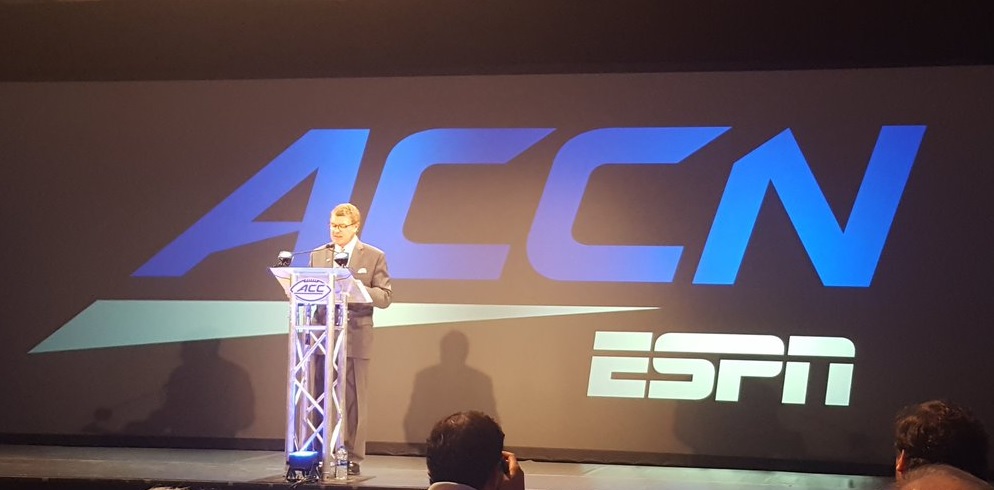
ACC Commissioner John Swofford addressed the media at the start of today’s 2018 ACC Football Kickoff, and he touched on the topics of the ACC Network, rule changes across college football, declining college football attendance, and how the Supreme Court’s ruling on sports gambling may affect college athletics.
Swofford began by touting the league’s accomplishments on and off the fields of play, all of which came nearly verbatim from ACC Notes available at the event. Click here to see the talking points.
ACC Network Update
Swofford then moved on to the topic of the ACC Network, which is still on schedule to launch its “linear” channel in August of 2019. It has been two years since Swofford announced the network at the 2016 ACC Football Kickoff, and with just one year left to go, there is still little to no information being distributed publicly on carriage deals or projected revenue.
Swofford ticked off a long list of individuals involved in the network, and during his comments, he noted that all member schools are on course to have their on-campus ACC Network facilities completed in time for the linear launch. “They’ve done an excellent job in preparing for the ACC linear productions, while simultaneously producing over 1,000 games last year for ACC Network Extra, well beyond the 600 which we initially anticipated.”
In 2019 (Swofford wasn’t clear if he meant calendar year 2019 or the 2019-20 academic year), Swofford said the ACC Network linear channel and the ACC Network Extra streaming service will broadcast over 1,400 events, an average of nearly 100 events per school.
Addressing programming, Swofford noted that ESPN and the league will get to work soon on ironing out specifics. “This fall we will finalize the live event programming schedule for the fall, winter and spring sports. Throughout the academic year, we’ll begin the process of considering our non-live program needs and reviewing different show ideas that will be on the ACC Network. And by next spring, we will have identified the talent for the programs that we create, as well as our lead game announcers for all sports.”
Swofford unveiled the network logo, shown behind him in the picture at the top of this article.
Rule Changes and Recruiting Changes
Swofford noted that the ACC’s football coaches view the December early signing period, the first of which occurred last December, as “a positive addition to the recruiting calendar.”
He also touched on a couple of rule changes that he thinks benefit the players: the new redshirt rule, which says a player can play in up to four games and still classify the season as a redshirt year; and the new transfer rule, which says an athlete can transfer to a new school without requiring permission to do so from his old school. Schools could previously block athletes from transferring to certain schools.
On the redshirt rule: “The opportunity to have limited game experience without penalty, especially when you consider the length of the season and possible attrition during the season, should be an overall benefit of the game, the players and the coaches.
“As a former player who sat out a year with an illness and spent that year not playing the game, that’s a tough thing to do. And for a player to have the opportunity to play in three or four games gives the coaches the opportunity to certainly evaluate them better, prepare them better for when they’re playing on a more regular basis, and it gives players the opportunity to hang in there, so to speak, as they get through what would have been a redshirt year of not playing at all. So I think it’s a tremendous change for the players.”
Swofford added, “The early signing period as well as the new redshirt rule were both initiated by the ACC.”
College Football Attendance
The NCAA started compiling college football attendance records 70 years ago, and in 2017, for the first time ever, attendance declined for a fourth straight season. Like athletic directors around the country, Swofford knows there is no magic wand to solve the problem.
“I think what our schools are finding is sharing that kind of information about the in-stadium experience and also modernizing stadiums and bringing them up to snuff, so to speak, so that the in-game experience is as good as it can be … it can also start on the field with keeping the game going. We’re continually working at reducing the length of games. I really harp on this all the time with our officials particularly, so I’m pleased to tell you that the ACC in terms of conference games, we had the shortest length of conference games of any of our peer conferences last year and I think the year before, as well, if I’m not mistaken. And that’s a good thing.”
Gambling and College Sports
In May, the US Supreme Court struck down a federal law prohibiting sports gambling, paving the way for states to legalize sports gambling. Swofford was asked a few questions about this, starting with a question about how legalized gambling might affect injury reports.
“We have had, not a rule, but a gentlemen’s agreement among our coaches to share publicly injury information. We were the only conference that was doing that, and ironically, we decided not to do it this year, so we won’t be doing it this year.”
He added, “My general feeling, and I sense that our coaches’ general feeling is the same, that that’s probably something that needs to happen on a national basis. I don’t think it’ll happen for this season. I suspect it’ll be for next season, but I’ll be surprised if that’s not in place.” Check Food 4 Less Ad and Food City Ad.
On the topic of how gambling might affect college sports in general, Swofford admits “I may be the most naïve person in the world about gambling … I can’t even tell you the lingo that goes with it.”
Swofford also admitted that he doesn’t know how legalized gambling could affect college sports, but he did add the most quotable line of his press conference: “But I know it can be incredibly problematic for the integrity of our games. I don’t like the optics of gambling in college sports.”
Other Notes
The ACC has signed an agreement with the Charlotte Sports Foundation and the Carolina Panthers to keep the ACC Championship Game in Charlotte through 2030.
The ACC’s three-decade-plus agreement with Raycom to syndicate ACC sports will end after the 2018-19 academic year. “In today’s world, those kinds of long-term relationships just don’t happen very often,” Swofford said. Swofford’s son Chad has been employed by Raycom since 2007 and is the General Manager of ACC Digital at Raycom Sports.





 Print
Print







The NFL seems to handle game stoppage better if you have ever noticed. They use the dead time after a kick off for a short break and play begins immediately once they get back to the game after a break. Within a few seconds it seems.
Swofford should should be in politics. He can spew 10,000 words, and still say nothing of importance.
Who wants to bet Sonny Boy Jr ends up @ ACCN running content & ACC digital programming?
Can’t see how Johnny Boy can leave Sonny Boy out of the ACC paydays, especially after his stunt with Raycom to get him employed.
Can’t wait for the day the ACC has a fresh set of eyes and new leader in Greensboro.
Let’s Go…Hokies!!!
Beat F$U!!!
The ACC replay officials are a complete joke. They review every other play, and take a lot of time doing so. They could cut a lot of time fixing whatever problem exists there.
Two comments on the “reducing the length of games” topic.
(1) ACC games are shorter than any other conference at least in part because there are 8 games where GT is playing. Any game they play only lasts about 2-1/2 hours. No other P5 conference has a program like that.
(2) When you work to reduce the length of games, PLEASE do it in such a way that doesn’t give us less football. A football game only has about 8-12 minutes of actual action in it. There is no good reason to reduce any of that so that the total run time is shorter. Cut out the fluff, put limits on replay, run inset commercials between plays instead of stopping all the action to go to commercial. Other sports have figured out how to generate ad revenue without a steady stream of clock stoppage; learn from them. Don’t just run the game clock during times when it used to stop (thus giving us fewer plays).
I believe the TV timeouts in a game (especially if you are at the game) make it seem so much longer. I expect this will only increase as sponsors come on board the digital network. It also disrupts the flow of the game, but it is necessary I suppose.
Sounds like the injury reports will even more secretive this year.
maybe this year they wont wait to tune into the game intro after its already started.
It dependents on why the game is short. Longer games aren’t bad for the fans because they are long. They are bad for the fans because of the interruptions.
the interruptions would be more bearable to me if they doubled the length of a tv timeout and then had half as many. that would give all the old men a chance to pee and everyone else could freshen their drink and refreshments!